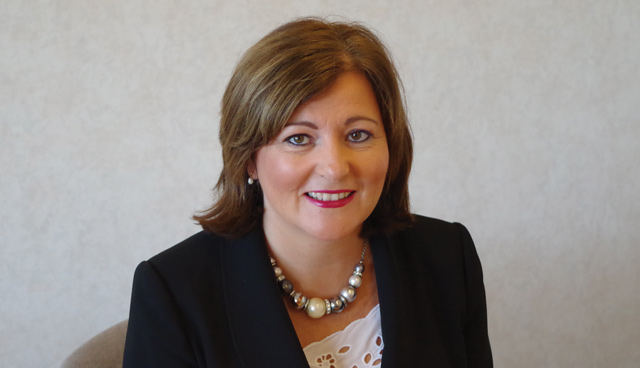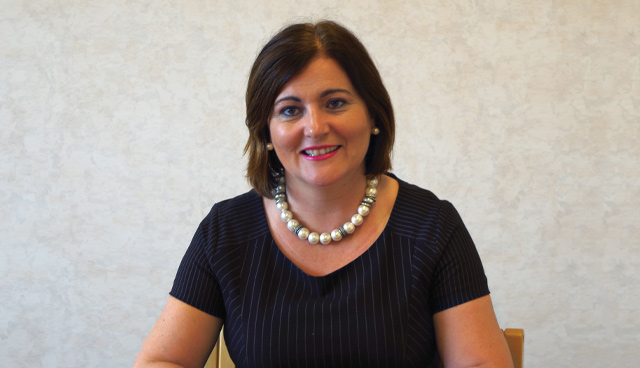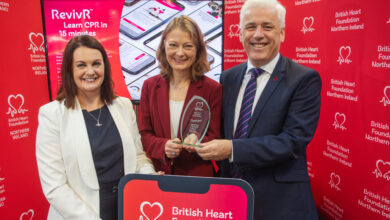Chief Nursing Officer: Charlotte McArdle

Northern Ireland’s Chief Nursing Officer Charlotte McArdle speaks to David Whelan about workforce pressures, Covid-19 surge planning and the retained ambition for major transformation.
In January 2020, resolution of a pay dispute with nurses and healthcare workers which served to catapult political parties towards a new consensus, brought with it a sense of renewed optimism.
Not only did the pay deal bring an end to service disruption but the New Decade, New Approach (NDNA) political agreement had, at its core, ambitions for significant improvement and much-needed transformation of Northern Ireland’s health system.
Fast forward just a few months and the level of disruption on those ambitions was unprecedented, with Covid continuing to be the focus of attention and resources for the foreseeable future.
Contextualising of the level of disruption brought about by Covid-19, McArdle highlights a selection of major commitments contained within NDNA which were either Department of Health led or had the Department’s involvement including the development and delivery of a cancer strategy for Northern Ireland, a mental health strategy and the wider rollout of multi-disciplinary teams across primary care as a key element of transformation.
“One of the Minister’s first jobs was to achieve resolution over the pay dispute and once that was resolved and we looked forward, knowing that we had NDNA, there was a sense of optimism of having a new Executive. I think everyone was on the front foot and we could see the opportunity to get a lot of things moving again that we had envisaged around the workforce and transformation, which sit hand-in-hand,” explains McArdle.
As the Department of Health’s Chief Nursing Officer, McArdle has a role of substantial breadth, primarily leading the nursing, midwifery and allied health professional’s contribution to the development and implementation of health and social care policy in Northern Ireland. McArdle is also the professional lead, as the most senior nurse for the professions of nursing and midwifery, and policy lead for the Department on a number of areas including partnership working, co-production and co-design and patient experience and feedback.
In more recent times, McArdle has undertaken the role as senior responsible officer for surge planning and led on the development of Northern Ireland’s first ‘Nightingale’ hospital in Belfast and more recently, an additional one in Whiteabbey.
Prior to the emergence of Covid, one of McArdle’s many priorities had been the development of a new nursing and midwifery strategy. In March 2020, the World Health Organisation-designated ‘Year of the Nurse and Midwife’, Health Minister Robin Swann MLA launched the Nursing and Midwifery Task Group report, which had been commissioned by his predecessor Michelle O’Neill MLA and had been chaired by Richard Barnett. This series of recommendations, explains McArdle, had set out a direction of travel for the professions, in line with transformation, for the next 10-15 years and was to form the basis of the new strategic plan.
Covid has served to disrupt many of those early ambitions brought and included in NDNA. The cancer strategy, for example, was originally planned for December 2020 and now faces a six-month delay while the mental health strategy, given the same timeframe, has not had a new date attributed. The new strategic plan for nursing and midwifery has also been disrupted, explains McArdle, however, some progress has been made.
“Work on the Task Group report hasn’t stopped completely. Included in the recommendations was a need for an increase in the undergraduate programme places to continue to grow the number of nurses in training and that’s happening. Additionally, under NDNA we got around £60 million over three years for safe staffing and some of that money has already been fed into the service. So, there is some development happening but not at the speed that we would have liked.”
Quizzed on whether she envisages the strategy to now be delivered in 2021, McArdle explains that no firm targets have yet been set: “I haven’t set any firm plans for 2021 yet until we see what happens with the virus. We are still expecting another big surge in the new year and obviously, with the vaccination programme we need to wait and see how that pans out, but we’re expecting to be living and working with Covid for another while yet.”
Covid-19
Turning to the impact of Covid, McArdle points to the huge volume of work required to prepare the workforce at the start of the pandemic. In the early period, the Department asked all third year nursing and midwifery students to come into practice on paid placements and with this came not only the need to change regulations for student nurses but also to provide guidance and support packages, job descriptions and get agreement from the trusts as to how that would work. McArdle commends the work of these students and the contribution that they made.
The Chief Nursing Officer also describes the volume of work on developing Northern Ireland’s first Nightingale hospital in just a matter of weeks as an “unbelievable achievement” given the operational detail required ranging from oxygen and ventilator supply through to staff availability and PPE guidance.
Additionally, her team worked closely with the social care sector, specifically nursing homes, ensuring that the trusts could support them with their workforce needs, and making sure that guidance and PPE was in place. McArdle was and remains responsible for visiting guidance in this respect. Acknowledging that the many complexities of visiting restrictions in maternity and care homes is upsetting for families, she says that ongoing challenges remain a priority for her.
“I think the policies were in place but there was so much guidance coming out on different elements of care, very quickly, that it was hard for the independent sector and the care homes to keep up.”
In the summer of 2020, McArdle’s team led on the Department’s rapid learning initiative in relation to care home sector, analysing the first surge to better prepare for further pressures. Asked to assess performance in this area, McArdle says: “In broad terms Northern Ireland did quite well. Any death is devastating for a family and we recognise that, but Northern Ireland did well in regard to the number of people we managed to keep alive. Our care homes worked really well and did a fantastic job of keeping people safe.
“There were a number of issues. Covid hit us so fast we were working to, reacting to and learning from the evidence, with things changing very quickly. Every time there was a change, the guidance and policies needed updated and distributed to the right people so that everyone knew what was expected of them.
“We took the opportunity to look at surge one in the care home sector: what worked well, what didn’t and what we would need to put in place to support and help for the next surge. That was done very quickly, and a series of recommendations made to the minister were agreed and put in place as quickly as we could. The longer-term ones are now wrapped into the surge plan for the winter period.”
Initial concerns in the care home sector at the virus’s outbreak are well documented. Some care homes struggled to source adequate PPE in the early days and in July 2020 it was revealed that over 40 per cent of Covid-19 deaths in Northern Ireland had occurred in care homes (current figures on 4 December: 33.6 per cent). Asked whether safeguards were in place early enough to prevent the level of loss in the care home sector, McArdle says: “I think the policies were in place but there was so much guidance coming out on different elements of care, very quickly, that it was hard for the independent sector and the care homes to keep up. Plus, they were struggling with staffing. We’re in such a better place now in terms of understanding how the virus behaves and how we can control the spread.
“We were very much learning as we went, and things were changing very quickly and that’s a very difficult environment to be working in. Sometimes that can appear as confused and mixed up but it’s because the information was changing so quickly.”
McArdle says that lessons were learnt: “At the start there were issues with PPE, there is no doubt about that but that was very quickly rectified with trusts providing PPE to the care homes. There were issues about staffing, again the trusts provided a huge amount of manual hours with people moving from trusts to care homes to make sure that the residents were safe. Enhanced cleaning regimes were put in place and support provided for testing, but these things are iterative and take time, so we have learnt a huge amount and that was the purpose of the review in the summer.”
Workforce
Another major challenge has been the pressure and strain being put on the healthcare workforce since the pandemic began. In late August, a Royal College of Nursing official described nurses in Northern Ireland as “underfunded, understaffed and undervalued”. Asked if this is an assessment she would agree with, McArdle says: “Frontline staff are working in very complex and challenging situations, there is no doubt about that. And we have had significant vacancies in the nursing and midwifery workforce.
“However, underinvestment in undergraduate training places has been rectified since 2016 with an increase of 87 per cent of undergraduate places across three universities (The Open University included). In fact, September 2020 saw the highest number ever start their nursing and midwifery training with over 1,300 people taking up undergraduate places.
“The increase in places is clearly having an impact. Recently published workforce statistics show that we’ve seen a reduction in the vacancy level from its highest point of 13.1 per cent in 2018 to 7 per cent currently.
“I can see from a practitioner perspective why people would feel undervalued, but I think there is widespread recognition of the job being done. The pandemic has shone a light on the healthcare system’s reliance on nurses and midwives and the huge contribution that they make.”
Vaccine
While news of vaccines is very much welcome, there is a recognition that rollout could increase the pressure on the health service. Speaking in the week that approval of the Pfizer/BioNTech vaccine was first announced, McArdle acknowledges that nurses have been leading the vaccination programmes every year and are probably the best placed group to lead on how to administer and provide this vaccination.
“The PHA team are working very closely with the Department to take that forward and there has been a call out through the workforce appeal for retired staff to come back and be part of those teams. It can’t be completely nurse-dependent because we simply do not have enough staff to continue to manage Covid, given that we anticipate a rise in cases post-Christmas. We will need our nurses and healthcare staff managing a rise, plus winter pressures that we would normally face.”
“We need to get to a stable place where we can sustain the workforce and ensure we have enough nurses and midwives to provide the care that is needed, in line with the transformation programme.”
Priorities
Stabilising the nursing and midwifery workforce, a key recommendation of the Task Group Report, remains a key focus for McArdle who says that more work needs to be done to get to a better space than has been the case for some years and importantly, maintaining that.
“There has been huge investment and at a point in time we are going to have to work out how we divest,” she states. “We won’t be able to continue having 1,300 undergraduate places every year because the system can’t cope with that number of people in training. However, the money then needs to be diverted to other professional groups that need to increase their workforce like physios, occupational therapy and medicine.
“We need to get to a stable place where we can sustain the workforce and ensure we have enough nurses and midwives to provide the care that is needed, in line with the transformation programme.”
Two areas which McArdle envisages a greater input for nursing is in the area of cancer, where she believes more can be done to provide cancer care treatments closer to home, and in the public health sphere, in relation to work to enable communities to manage their own health and helping to address health inequalities.
She adds: “I would really like to see nursing engaged in decisions and having a place at every decision-making table, in terms of health in all policies. Most of what we do in terms of health outcomes is actually delivered by other parts of our government system and not the Department of Health and so I would like to see a greater level of involvement.”
Looking further out, McArdle would like to see the transformation of health and social care over the next decade. “Hopefully, post-Covid, many of the plans we have put in place in terms of hospital reconfiguration, cancer care and multi-disciplinary teams in primary care can progress and flourish. However, I would stress that this will need a continued investment plan from the Executive.
“The challenges of the future are about changing the health system to one which is much more community and primary care focused and where home is the best and first place for care.”






